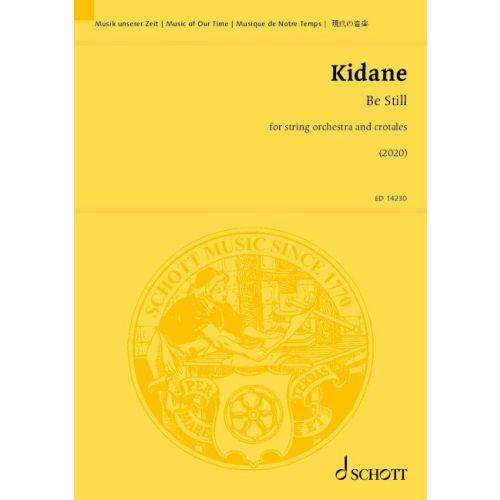Lieferzeit
2-3 Tage
Be Still
for string orchestra and crotales
orchestre à cordes et crotales
Written towards the end of 2020, ‘Be Still’ is a reflective piece on the year gone by. In a year where lockdowns became a thing, the idea of time became more apparent to me as everyday markers, such as meeting with friends and family, travelling or attending concerts vanished.
Prix à partir de
6,99 €
TTC
Détails du produit
Description
Written towards the end of 2020, ‘Be Still’ is a reflective piece on the year gone by. In a year where lockdowns became a thing, the idea of time became more apparent to me as everyday markers, such as meeting with friends and family, travelling or attending concerts vanished.
Whilst writing ‘Be Still’ the opening lines of TS Eliot's Burnt Norton, the first of his Four Quartets, came to mind:
Time present and time past/ Are both perhaps present in time future/And time
Future contained in time past/ If all time is eternally present/ All time is unredeemable.
And as I look back at the year and attempt to fix in my mind events, they slither away from my grasp – like clouds passing by in the sky.
Daniel Kidane
Orchestral Cast
perc(crot)-str
Plus d'infos
Titre:
Be Still
for string orchestra and crotales
Edition:
Partition d'étude
Maison d'édition:
Schott Music
Year of composition:
2020
Durée:
8 ′0 ′′
Série:
Titre:
Be Still
for string orchestra and crotales
Edition:
Partition d'étude
Maison d'édition:
Schott Music
Year of composition:
2020
Durée:
8 ′0 ′′
Série:
Titre:
Be Still
for string orchestra and crotales
Edition:
Partition d'étude
Maison d'édition:
Schott Music
Year of composition:
2020
Durée:
8 ′0 ′′
Série:
Détails techniques
Numéro du produit:
ED 14230
ISMN13:
979-0-2201-3991-8
Type de support:
Partition
Numéro du produit:
ED 14230
ISMN13:
979-0-2201-3991-8
UPC:
842819124504
Poid:
0,08 kg
Pages :
16
Format:
21cm x 29.7cm
Obligatoire :
Reliure à dos agrafé
Fabricant:
Type de support:
Partition électronique en PDF
Numéro du produit:
ED 14230 Q782351
ISMN13:
979-0-2201-3991-8
Pages :
14
Format:
21cm x 29.7cm
Format de fichier:
(PDF / 230,87 KB)
Fabricant:
Plus de cette série
Music Of Our Time
Commentaires
Seul(e)s les utilisateurs/-trices enregistré(e)s peuvent écrire des commentaires. S’il vous plaît, connectez-vous ou créez un compte.





